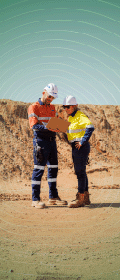 3D Laser Mapping has embarked on a research project in partnership with Durham University, following the award of a share of a multi-million pound government grant. The project, which aims to develop new models for slope failure monitoring, will be used to improve the safety and operational efficiency of mining companies around the world. Knowledge Transfer Partnerships (KTP), like this one between 3D Laser Mapping and Durham University, help businesses improve their competitiveness and productivity through the better use of the knowledge, technology and skills that already reside within UK colleges and universities.
3D Laser Mapping has embarked on a research project in partnership with Durham University, following the award of a share of a multi-million pound government grant. The project, which aims to develop new models for slope failure monitoring, will be used to improve the safety and operational efficiency of mining companies around the world. Knowledge Transfer Partnerships (KTP), like this one between 3D Laser Mapping and Durham University, help businesses improve their competitiveness and productivity through the better use of the knowledge, technology and skills that already reside within UK colleges and universities.
Dr Graham Hunter, 3D Laser Mapping’s Executive Chairman and Founder said: “KTP supports innovation led partnerships between commercial organisations such as 3D Laser Mapping, leading academic institutions like Durham University and external stakeholders such as the Technology Strategy Board. It is the leading knowledge exchange programme in Europe and we are extremely proud to be a part of it.” He continued: “By utilising the recently gained knowledge and expertise of our KTP Associate we can build on our existing mine monitoring solution SiteMonitor and incorporate the latest principles and innovations from academic research.”
The project sees KTP Associate Dr Ashraf Afana join the 3D Laser Mapping team from Durham University where he will work on a three year placement on the integration of full waveform (FW) data processing into the ‘SiteMonitor’ product. Afana, who has a PhD in Fluvial Geomorphology from the University of Almeria in Spain, will be working in a ‘hands-on’ technical position developing and implementing a slope monitoring system that utilises strain-rate based failure modelling. He will work closely with 3D Laser Mappings Research and Development division and will undertake project work with some of the world’s leading mining companies. Afana added, “This is a once in a lifetime opportunity. I get to work at the cutting edge of slope monitoring research and development software using my knowledge and skills to further develop a system that is already saving lives and improving efficiencies. I will gain hands-on experience of the system and get the opportunity to extract first-hand feedback from existing and potential users.” The partnership received financial support from the Knowledge Transfer Partnerships programme (KTP), the Technology Strategy Board and other government funding organisations.









